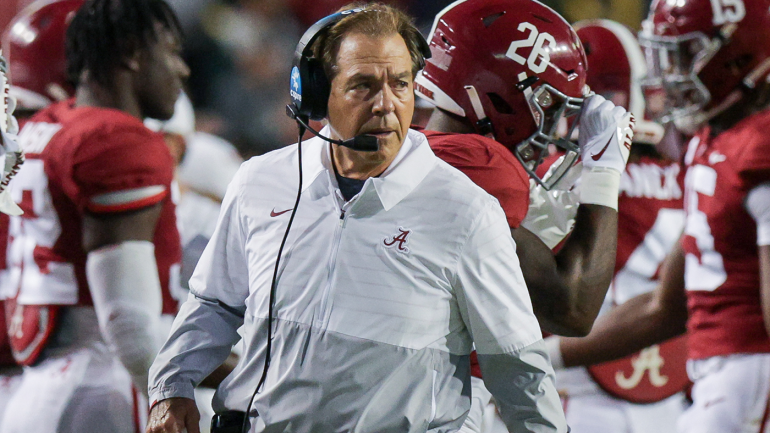
The SEC is expected to finalize its football scheduling format for 2024 and beyond next week when coaches and administrators convene in Miramar Beach, Florida, at the league's annual spring meetings. One of the main topics on the table will be whether the league moves to a nine-game schedule after expansion -- a move that, according to multiple reports, is quickly losing support.
Administrators have been debating proposed models since the conference announced in June 2021 that it will add Texas and Oklahoma. The finalists are a nine-game format that would feature three permanent rivals and six rotating opponents or an eight-game format that consists of one permanent rival and seven rotating games.
Brandon Marcello of 247Sports reports that Alabama coach Nick Saban is emerging as one of the primary opposing voices to the nine-game model. Saban has long supported adding games to the SEC schedule as far back as 2012 when Texas A&M and Missouri joined the league.
"When you increase the size of the league by 15 percent, you've almost got to play more games to get a true indication of who's the best team in the league," he said in 2012. "We should come up with some format in the future where every player in the league gets an opportunity to play every team in the league. We've kind of had that in the past. This format won't necessarily give every player an opportunity to do that."
Both of the proposed formats heading into 2024 give teams the chance to face each opponent in the conference every other year, which comes close to satisfying Saban's desires. However, Saban seemed a bit frustrated in March when he got wind of the three permanent opponents that were proposed for the Crimson Tide.
"I've always been an advocate for playing more [conference] games," Saban told Sports Illustrated. "But if you play more games, I think you have to get the three fixed [opponents] right. They're giving us Tennessee, Auburn and LSU. I don't know how they come to that [decision]."
Marcello reports that Arkansas, Kentucky, Mississippi State and South Carolina opposed the nine-game model, while Auburn, Tennessee and Ole Miss remain undecided about their votes. Vanderbilt has not indicated which proposal it favors.
There are drawbacks to each format. The eight-game model would eliminate a current permanent opponent, which means rivalries like Auburn-Georgia, Tennessee-Alabama and others could be in jeopardy of not being played on annual basis. The nine-game model would keep the vast majority of rivalries intact but could create a massive disparity on team's strength of schedule.
The expanded, 12-team College Football Playoff is one of the factors involved as well. That wasn't even a glimmer in the eyes of administrators when Texas A&M and Missouri joined the SEC, but now the path to earning one of those spots has drastically changed since the four-team model was announced in the spring of 2012.
Plus, as Marcello notes, 12 of the soon-to-be 16 conference teams have four non-conference games schedule in 2024, and nine are fully booked out until 2026.





















